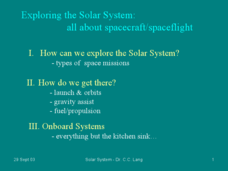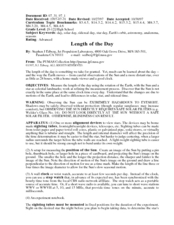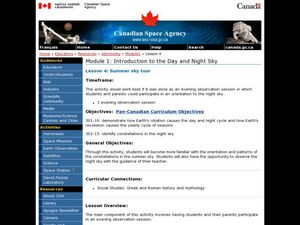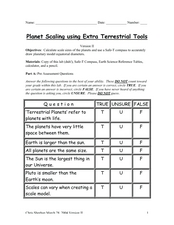Curated OER
Exploring the Solar System: All About Spacecraft/Spaceflight
Rarely do you find resources that reach high school astronomy learners. Here is something at their level! The physics of flyby missions is explained via several examples. Landing, penetrating, and roving spacecraft are examined. Diagrams...
New Mexico State University
Lab 6: Kepler's Laws
A 15-page package thoroughly teaches your physics or astronomy learners about Kepler's three laws of planetary motion. Each one is stated and explained. Class members answer questions, solve problems, and participate in the classic...
Center for Math and Science Education
Pocket Solar System
How in the world can something as big as the solar system possibly fit in your pocket? Complete this simple modeling activity and find out, as young scientists gain an appreciation for the incredible scale of outer space.
Center for Math and Science Education
Solar System Launch
Trying to understand the vastness of outer space can be quite a challenge for young scientists. Help put things in perspective with this cross-curricular activity as students work in pairs creating scaled models of the solar system,...
media.yurisnight.net
Science Lesson Plan: Our Solar System: I Wonder?
Ever wonder why Pluto isn't considered a planet? Or how large the Earth is compared to the other inner planets? Explore the universe with a series of projects that simulate different aspects of our solar system. The activities require...
Curated OER
Astronomy
Students complete a unit of lessons on our solar system, its stars, and astronomers. They record information in a space journal, design constellations, define key vocabulary, observe the phases of the moon, and create a group planet...
Curated OER
Measuring the Diameter of Our Star
Young scholars conduct an experiment to measure the diameter of the sun. In this astronomy lesson, students construct a simple equipment to collect scientific data. They calculate the sun's diameter using a given formula.
Curated OER
Universal Gravitation
Students create a KWL chart about gravity. In this astronomy class, students investigate the nature of gravity. They discuss common misconceptions and address them.
Curated OER
Sky Watchers: Ancient Astronomers
Learners close their eyes and picture the sky. They are asked to brainstorm things they may see in the course of a night and day, such as the movement of the sun, moon, and stars. Students work in groups to coduct their research. They...
Curated OER
Stellar Discoveries That Are Out of This World
Students hear of the recent discovery of a group of planets orbiting the star Upsilon Andromedae. Each student create a page about an element of the universe,
Curated OER
Galaxies
Tenth graders explore the structure and content of galaxies. Through discussion, lab, and hands-on activities, they discover the general structure of the three types of galaxies as well as the effect they have on the structure and...
Curated OER
Hot Air
Students conduct an experiment to determine how hot air affect the path of laser. In this physics lesson, students explain why stars appear to twinkle at night. They discuss how light travels from space to Earth.
Curated OER
Length of the Day
Students investigate how the Earth's rotation affect the length of day. In this earth science lesson plan, students construct a sighting apparatus and record their observations over a few days. They analyze data collected and formulate a...
Curated OER
Our Place in Space
Third graders identify the different planets that make up the solar system. In this space science lesson, 3rd graders construct a scale model of the major planets. They explore their different unique features and dress up as planets.
Curated OER
How Do Astronomers Measure Distances to Stars?
In this astronomy instructional activity, students participate in an activity using the parallax effect to measure star distances. They record their information in a data table then complete 5 fill in the blank conclusion questions.
Curated OER
History of Saturn Discoveries
Students interpret how scientists have explored Saturn. In this NASA based astronomy lesson, students create a timeline depicting the study of Saturn from 1610 until 2010. Each student will write a letter to Galileo discussing how the...
Curated OER
Summer Sky Tour
Learners explore space science by participating in a constellation identification activity. In this astronomy lesson, students view star charts based on the different seasons and define a list of astronomy related terms. Learners...
Curated OER
Settlement Exploration: Then and Now
NASA has crafted an imaginative and memorable series of lessons, "NASA and Jamestown Education Module." This lesson is one of the five components. In it, middle schoolers connect history and science by comparing the settlement of...
New York Science Teacher
Planet Scaling using Extra Terrestrial Tools
Your class will use a set scale to convert diameters of planets to the model size, the diagram given to expand on the number of planets drawn as concentric circles, and examine the scale that would be needed to fit the larger planets on...
Curated OER
Materials for Teaching Modern Physics
A must-see for any physics teacher! You will find 217 pages of physics activities and worksheets that cover motion, electricity and magnetism, light, modern and quantum physics, and astronomy. Each activity comes with an answer key for...
Curated OER
En Sécurité Sous Les Étoiles
Do you like astronomy? Engage your learners with this short reading passage about a boy who loves studying stars and space. After completing the reading, your middle schoolers will complete five simple recall questions. Perhaps you can...
American Museum of Natural History
Being an Astronomer: Neil deGrasse Tyson
An interview delves deep into the life of famous astronomer Neil deGrasse Tyson.
University of Texas
Lives of Stars
Stars exist from a few million years to over 10 billion years, depending on their mass. Scholars perform a play acting as stars to learn about their different life cycles. They develop an understanding of many of the fundamental concepts...
NASA
Collecting Electromagnetic Radiation
Astronomy is literally over your head, but this lesson will explain how we study it. Young scientists make telescopes, calculate and compare the light gathering power of lenses, and simulate detection of infared radiation. Materials...
Other popular searches
- Astronomy and Space Science
- Astronomy Vocabulary
- Planets and Astronomy
- Astronomy Activity
- Science Astronomy
- Ancient Astronomy
- Astronomy Lesson Plans
- History of Astronomy
- Space Science Astronomy
- Space and Astronomy
- Astronomy Navigation
- Astronomy History

























